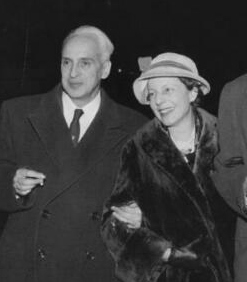Severo Ochoa
Severo Ochoa de Albornoz (24 September 1905 – 1 November 1993) was a Spanish-American biochemist and molecular biologist, and a joint winner of the 1959 Nobel Prize in Physiology or Medicine with Arthur Kornberg. His award was for their discovery of the mechanisms in the biological synthesis of RNA and DNA. Ochoa's work was pivotal in understanding the way in which genetic information is transferred from DNA to RNA.
Early Life and Education[edit | edit source]
Severo Ochoa was born in Luarca, Spain. He began his medical studies at the University of Madrid but due to the political unrest in Spain, he moved to the University of Glasgow, where he completed his studies. Ochoa's early research was in the field of enzymology, and after receiving his doctorate, he worked in several laboratories across Europe, including the National Institute for Medical Research in London and the University of Heidelberg.
Career and Research[edit | edit source]
In 1941, Ochoa moved to the United States, where he would spend the majority of his professional career. He initially worked at the Washington University in St. Louis, and later joined the faculty of the New York University School of Medicine, where he established the Department of Biochemistry. He became a naturalized U.S. citizen in 1956.
Ochoa's most significant contribution to biochemistry was his discovery of an enzyme that was capable of synthesizing RNA, which he named polynucleotide phosphorylase. This discovery was crucial for the understanding of how genetic information is transferred from DNA to RNA, an essential process for the synthesis of proteins within cells, and laid the groundwork for the field of molecular biology.
Nobel Prize[edit | edit source]
In 1959, Severo Ochoa was awarded the Nobel Prize in Physiology or Medicine along with Arthur Kornberg for their discoveries in the enzymatic synthesis of RNA and DNA. Their work was fundamental in the understanding of the molecular basis of heredity.
Later Life and Legacy[edit | edit source]
After retiring from active research, Ochoa continued to be involved in the scientific community, serving on various advisory boards and committees. He passed away in Madrid, Spain, on 1 November 1993.
Ochoa's legacy is marked by his contributions to the field of biochemistry and molecular biology. He is remembered not only for his scientific achievements but also for his role as a mentor to future generations of scientists.
Awards and Honors[edit | edit source]
In addition to the Nobel Prize, Severo Ochoa received numerous awards and honors throughout his career, including the National Medal of Science in 1979. He was a member of the National Academy of Sciences and the American Academy of Arts and Sciences, among other prestigious organizations.
See Also[edit | edit source]
Search WikiMD
Ad.Tired of being Overweight? Try W8MD's physician weight loss program.
Semaglutide (Ozempic / Wegovy and Tirzepatide (Mounjaro / Zepbound) available.
Advertise on WikiMD
|
WikiMD's Wellness Encyclopedia |
| Let Food Be Thy Medicine Medicine Thy Food - Hippocrates |
Translate this page: - East Asian
中文,
日本,
한국어,
South Asian
हिन्दी,
தமிழ்,
తెలుగు,
Urdu,
ಕನ್ನಡ,
Southeast Asian
Indonesian,
Vietnamese,
Thai,
မြန်မာဘာသာ,
বাংলা
European
español,
Deutsch,
français,
Greek,
português do Brasil,
polski,
română,
русский,
Nederlands,
norsk,
svenska,
suomi,
Italian
Middle Eastern & African
عربى,
Turkish,
Persian,
Hebrew,
Afrikaans,
isiZulu,
Kiswahili,
Other
Bulgarian,
Hungarian,
Czech,
Swedish,
മലയാളം,
मराठी,
ਪੰਜਾਬੀ,
ગુજરાતી,
Portuguese,
Ukrainian
Medical Disclaimer: WikiMD is not a substitute for professional medical advice. The information on WikiMD is provided as an information resource only, may be incorrect, outdated or misleading, and is not to be used or relied on for any diagnostic or treatment purposes. Please consult your health care provider before making any healthcare decisions or for guidance about a specific medical condition. WikiMD expressly disclaims responsibility, and shall have no liability, for any damages, loss, injury, or liability whatsoever suffered as a result of your reliance on the information contained in this site. By visiting this site you agree to the foregoing terms and conditions, which may from time to time be changed or supplemented by WikiMD. If you do not agree to the foregoing terms and conditions, you should not enter or use this site. See full disclaimer.
Credits:Most images are courtesy of Wikimedia commons, and templates, categories Wikipedia, licensed under CC BY SA or similar.
Contributors: Prab R. Tumpati, MD


